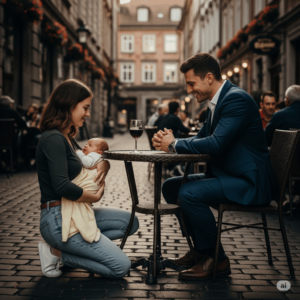The February wind howled over the old cemetery outside Willowbrook, Massachusetts, chasing the dry leaves between slanted crosses and modest headstones. Andrew Carter walked steadily, wrapped in a warm black coat, his hands in his pockets. His face remained calm, almost distant, although inside his thoughts boiled restlessly.
The businessman visits his wife’s grave — and stops short when he sees a sleeping child on his tombstone…
As he did every year, Andrew came here to perform his silent ritual: to visit the grave of his wife, Helen. Five years had passed since his departure, and although the outward pain had already faded, Andrew was still broken inside. That day had taken away not only the love of his life, but also the warmth of his home in the historic district, the joy of nights spent with coffee, and the invisible bond that kept him afloat.
He stopped at a simple gray granite tombstone. Helen’s name was engraved in clear letters, along with the dates of her life, now so distant. Andrew watched her in silence, feeling the cold seep through her clothes.
He was not one to express his feelings out loud.
“Five years now,” he muttered quietly, as if speaking louder could break something sacred in the air.
He turned to leave, but stopped. A soft sound reached him. A whisper? A change in the wind? No… anything else.
He looked around, waiting for nothing, until he saw it: a small figure huddled by the memorial bench under the trees. A child, no more than six or seven years old, wrapped in a worn-out blanket, curled up as if trying to disappear from the world. In his hands, he held a crumpled photograph against his chest as if it were a holy relic.
Andrew’s steps were slow, cautious. His first thought was one of confusion. Who would leave a child out here in this cold? His second thought was anger. This was not a place for games or intruders. He opened his mouth to speak, but stopped.
The boy moved, his eyes flickering, widening and filled with something that seemed too heavy for someone so young. Then came the whisper, barely louder than the breeze:
“I’m sorry, Mom… I didn’t want to fall asleep here…
Andrew’s breathing stopped.
“Mom?”
He looked down, then back at the boy, and something changed in his chest. Irritation turned to uneasiness.
“Who are you?” He asked, but the boy remained silent, only pressing the photograph tighter to his chest, as if that could protect him.
Andrew frowned and reached out to the photo. The boy tried to resist, but he had no strength. When Andrew looked at the photo, his breath stopped.
It was Helen. Helen, smiling, with her arms around this child.
“Where did you get this?” Andrew’s voice trembled in disbelief.
The boy snuggled up more.
“She gave it to me,” he whispered.
Andrew’s heart pounded.
“That’s impossible,” he stammered.
The boy raised his head, and his sad eyes met Andrew’s.
“It’s not. Mom gave it to me before she left.
Andrew felt the ground slide beneath him. Helen had never mentioned this child to her. Never.
Who was he? And why was he sleeping on his grave, as if she were really his mother? The silence between them grew heavy, like a winter fog. Andrew squeezed Helen’s photo, but his mind refused to process what was happening. The boy looked at him with fear, as if waiting to be thrown out.
Andrew’s irritation began to turn to discomfort. He looked at the boy—Nathan, as he would later learn—standing in front of him, small and helpless, with those big eyes that looked too old for his age. The boy was shivering with cold, his cheeks red with frost, his lips cracked, as if he hadn’t had a hot drink in days. Andrew frowned.
“How long have you been here?” He asked, trying not to sound so annoyed.
“I don’t know,” Nathan whispered, embracing himself with thin arms.
“Where are your parents?” Andrew insisted, but the boy only looked down in silence.
Andrew’s patience began to fade, but instead of pressing harder, he sighed deeply. I was in the middle of a cemetery interrogating a child, which made no sense. He had to act.
“Come with me.” He said sharply.
Nathan’s eyes widened in surprise.
“Where?”
“To a warm place,” Andrew replied without elaborating.
The boy hesitated, his fingers squeezed the photograph.
“Aren’t you going to take it away from me?” He asked quietly, looking at the photo.
Andrew looked at Helen’s picture and handed it back to Nathan. The boy grabbed it with both hands, as if it were his last treasure. Andrew bent down and lifted the child in his arms; he was as light as a feather, which worried Andrew even more. Without saying a word, he headed for the exit of the cemetery.
This time, as he left Helen’s grave behind, Andrew felt something new. Not only did he leave behind his memory, but also the certainty that he knew her completely. And that terrified him more than he was willing to admit.
The Revelation and the Journey
Andrew’s old Ford pickup roared through the snowy streets of Willowbrook in complete silence. Nathan was in the back seat, pressed against the window, staring at the village lights with his eyes wide open, as if he were seeing this landscape for the first time. Andrew, holding the steering wheel, glanced briefly at him through the rearview mirror. It all felt like a dream: a strange boy with a picture of his wife, an orphanage he didn’t know, a mystery that destroyed his understanding of Helen.
He sighed deeply, trying to calm himself. I needed answers.
“How did you get to the cemetery?” He broke the silence.
Nathan paused for a few seconds before responding in a low voice:
“I walked.
Andrew gave him a skeptical look through the mirror.
“From where?”
“The shelter,” Nathan shrugged.
Andrew gripped the steering wheel harder.
“And how did you know where Helen was buried?”
Nathan hugged his knees, as if trying to get smaller.
“I followed her once,” he whispered.
Andrew felt a chill run down his spine.
—¿The seguist?
The boy nodded slowly.
“She used to come to the shelter. He brought candy, told stories. I wanted to go with her, but she said she couldn’t take me.
Something inside Andrew stirred. He imagined Helen in a small room of the shelter, with a bag of candy, smiling at this child. Why hadn’t I told him?
“One day, I saw her leave the shelter, I saw that she was very sad,” Nathan continued, lowering his head. “I followed her to see what was going on. She came here, to the cemetery. He stayed for a long time, crying, talking to someone. When he left, I went over and saw his name on the stone.
Andrew’s skin stood on end. But Helen had died five years ago. How could this be? He clenched his jaw, trying to gather his thoughts.
“And I’ve been coming here ever since,” Nathan finished, barely audible.
The truck fell into a heavy silence. Andrew’s jaw clenched, struggling with a whirlwind of thoughts. If the child wasn’t lying, then Helen had come to the cemetery for someone else before her death. Someone so important to her that she cried at her grave. And he had no idea who it could be.
He didn’t know his wife. The thought hit him like a slap in the face. Andrew took a deep breath and changed the subject.
“I’m going to take you to a place where you can rest.” He said, his eyes on the road.
Nathan looked at him cautiously.
“Where?”
“A motel,” Andrew replied, in a brief tone.
Nathan’s eyes widened even wider.
—Like in television programs?
Andrew felt an uncomfortable pain.
—Just a motel. Nada fancy.
Nathan didn’t seem convinced, but he didn’t argue.
“And then what?” he asked quietly.
Andrew kept his eyes straight ahead.
“Tomorrow I’ll go to the shelter. I’ll find out what relationship you had with Helen.
Nathan pursed his lips and turned to the window. Andrew noticed that the boy knew something, but he wasn’t ready to share it. He squeezed the steering wheel more. Tomorrow, he thought, I’m going to get the truth.
The next morning, Andrew woke up early, before the sun rose over the gray horizon of Willowbrook. The house was quieter than usual, the cold air seeped through the cracks of the windows, and the silence enveloped it like a heavy cloak. Nathan slept in the guest room, with the same photo of Helen pressed to his chest, just as he had brought it the night before. Although Andrew had decided to act, something in his chest was still fluttering. What had been going on with Helen that he didn’t know?
He still couldn’t process the impact of what he’d learned the night before. The child, that child, had been a part of Helen’s life, but he never knew it. Despite all the time they had spent together, it seemed that his wife had kept this secret, one that she didn’t even mention to him. Andrew knew he could no longer ignore this truth. He needed to discover more, even if it meant facing what he had avoided for so long: the lack of knowledge he had about the woman he loved.
After a quick breakfast and without many words, Andrew prepared for what he would have to do. He was going to go to the shelter, he was going to talk to those who knew about Nathan. And I had to face what I didn’t understand.
The shelter was not far from the city. It was a gray and worn building, with brick walls that showed the passage of time. Andrew parked in front of the place and, with a deep sigh, got out of the car. Nathan was going to come with him, but the boy stayed in the car, staring out the window, as if he was avoiding facing what was about to happen.
As he entered, the smell of damp and cleaning products greeted him, an oppressive air Andrew had not felt before. An older man greeted him at the entrance. He had a warm gaze, but his eyes also showed a hardness that can only be acquired after years of seeing pain.
“How can I help you?” The man asked, in a deep voice.
“I’m here for a boy named Nathan. Andrew cleared his throat. “I want to know more about him.
The man stared at him, it seemed like he was assessing how far Andrew wanted to go with that conversation. After a moment, he nodded.
“Follow me.” The man walked to an office at the back of the shelter.
Inside, there were photos of children on the walls and a desk full of papers. The man took a file from one of the shelves and sat down across from Andrew, slowly opening it. On the cover was Nathan’s name, with a date that coincided with his arrival at the shelter.
“Helen came here a few years ago. The man sighed, looking at the file. “I wasn’t a regular visitor, but every time I came, I brought candy for the kids. He often talked about his life, but never about his family. No one knew about Nathan, but he was always close to her.
Andrew listened, but there was something wrong. Why did Helen never mention the child to her? It was filling itself with more questions than answers.
“Why did you never tell me?” Andrew murmured, more to himself than to the man.
The shelter worker leaned forward, his tone changing.
“Because I knew you wouldn’t accept it. The man let out a tired sigh. “Helen loved you deeply, but she also knew you were trapped in your own world. When she tried to talk about adoption, you were overwhelmed by the work, by all that it entailed. He was afraid that it would destroy what was left of their relationship. So, he kept it a secret.
The answer hit him like a cold gust. Had Helen wanted to adopt the child? That explained a lot of things, but the disappointment of knowing that his wife had made that decision without him left a bitter taste in his mouth.
“Do you know if she planned to do the adoption?” Andrew asked, trying to stay calm.
The man looked at the file and nodded slowly.
“Yes. But he died before he could complete it. She was looking for a family for himself, but her illness stopped her before she could formalize it.
Andrew felt a knot in his stomach. Helen had wanted to adopt Nathan, and he hadn’t known anything. He hadn’t seen the signs, he hadn’t heard what she was trying to say. He had ignored what really mattered. He looked at the file once more, feeling anger build up in his chest.
“And the child?” Andrew asked, determined to get to the end of it all. “Where is he now?”
“Here.” He doesn’t want to leave this place, but we need him. There are families willing to adopt him, but Nathan is attached to Helen in a way we can’t easily break.
Andrew fell silent, taking in the enormity of what he was hearing. Helen had tried to do what he hadn’t been able to: give Nathan a home. And now, he was here, in front of him, not knowing what to do with all of it.
Andrew’s Decision
The afternoon passed slowly. When Andrew returned to the house, Nathan looked at him from the living room, his face small and vulnerable. Andrew saw the boy with different eyes now, more clearly. The bond that he had thought did not exist was real.
“Nathan, come here. Andrew called him softly.
The boy looked at him uncertainly, but got up and walked over. Andrew crouched down to his height and looked at him sincerely.
“Helen loved you very much. Andrew felt the lump in his throat. “And I… I want you to know that even though I wasn’t there when she needed you, I’m going to be there now.
Nathan’s eyes widened with a mixture of surprise and relief. It wasn’t just an empty promise; It was a real commitment. Nathan looked at him for a moment, then hugged Andrew with a shy, but hopeful squeeze.
“Thank you, sir. The boy said, and Andrew felt something deep inside him break, opening again.
That day, Andrew did not sign papers or make transactions. Instead, he sat down with Nathan, sharing dinner together at the kitchen table. Something changed. The space that had been empty and cold began to fill with a warmth I didn’t know.
Acceptance
The next day, Andrew contacted an attorney to start the adoption proceedings for Nathan. It didn’t matter if it was easy or difficult; it no longer mattered the work or the worries. He wanted this child as his son.
The news spread quickly among Andrew’s neighbors and close friends, who congratulated him on his decision. For him, however, the real gift was not the adoption itself, but the act of acknowledging what he had lost by not paying attention to the details of his own life.
Months passed, and Nathan adjusted to his new life. Andrew often found himself watching his son, amazed at the amount of love and courage that emanated from him. Nathan had not only given him a purpose, but he had also saved him from the loneliness he had been dragging around for so long.
A year later, on the day Nathan was officially adopted, Andrew looked at him as he signed the final papers. Finally, he had done the right thing.
When Nathan looked up and smiled at him, Andrew knew that although the past could not be erased, the future they built together would be far brighter than anything he could have imagined.
END.





